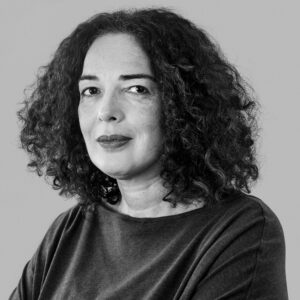
Caroline
ROOTS: Oostenrijk en Brazilië
Ik kom oorspronkelijk uit Oostenrijk, met een Braziliaans paspoort.
Mijn moeder is Braziliaanse, mijn vader komt uit Oostenrijk.
Ik ben geboren uit een studentenliefde.
Met twee ouders die nog helemaal niet klaar waren voor een relatie.
Laat staan een kind.
Ik ben toen ter adoptie aangeboden.
Als je geadopteerd wordt, ben je in de bloedlijn familie van je nieuwe ouders.
Dat viel lang niet bij iedereen goed.
De ene helft van mijn familie kan mij na vijftig jaar nog steeds geen hand schudden.
Die vinden het een rotschande.
Omdat ik hun naam draag én van kleur ben; vooral in die combinatie.
Ik ben niet boos. Ik wil er geen energie aan kwijt.
Ik kan wel goed meevoelen met mensen die worden buitengesloten.
Ik heb het met mijn ouders nooit over mijn roots kunnen hebben.
In die tijd dachten pedagogen anders over adoptiekinderen en diens ontwikkeling.
Praten met een adoptiekind over diens roots zou de hechting benadelen.
Mijn biologische moeder vroeg altijd naar foto’s van mij.
Mijn ouders in Nederland stuurden die ook altijd naar haar op.
Maar ze kwamen nooit aan.
Dat mocht niet.
Ik heb mijn adoptie pas op mijn zestiende ontdekt, in een testament van mijn oma.
Mijn moeder vertelde me dat ik dat nooit had mogen zien.
Als het aan haar lag, had ik het nooit geweten.
Zij heeft bij haar weten het beste gehandeld.
Maar ineens had ik een heel andere geschiedenis dan ik al die tijd dacht.
“All at once, it turned out that I had an entirely different personal history to what I had always imagined”
ROOTS: Austria and Brazil
I was born in Austria, on a Brazilian passport.
My mother is Brazilian, my father Austrian.
Born from the love between two students.
Two parents who were not at all ready for a relationship.
Never mind a child.
I was put up for adoption.
Once adopted, you’re then part of that family, you’re the blood of your new parents as far as you know.
Not everyone was enamoured of this in my case.
Even after fifty years, the one half of my family won’t even shake hands with the other.
I’m all a huge scandal to them.
I bear their name, but I’m a woman of colour – they cannot stand the combination.
I’m not angry about it, I don’t give it the head room or the energy.
It does give me affinity with people who are excluded, alienated in any way.
I was never able to discuss my ‘roots’ with my parents.
In those days, there were different thoughts on how to bring up adopted children.
Speaking to an adopted child about their roots would apparently only cause a rift in the family connection.
My birth mother had always asked to have photographs of me.
My Dutch parents did send her them, always, but she never ever received them.
It wasn’t allowed.
I only discovered all about my adoption when I turned sixteen, in my grandmother’s will.
My mother told me I should never have seen that.
If it had been up to here, I never would have known anything about it.
She thought she was doing the right thing, she did as she thought best.
All at once, it turned out that I had an entirely different personal history to what I had always imagined.

